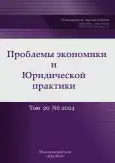Features of Accounting for Financial Assets in Budgetary Institutions
- 作者: Gaponenko V.F.1,2, Burtseva E.V.1
-
隶属关系:
- Academy of Management of the Ministry of Internal Affairs of Russia
- Institute of Public Administration and Management of the Russian Academy of National Economy and Public Administration under the President of the Russian Federation
- 期: 卷 20, 编号 6 (2024)
- 页面: 152-158
- 栏目: Regional and Sectoral Economics
- URL: https://bakhtiniada.ru/2541-8025/article/view/284591
- DOI: https://doi.org/10.33693/2541-8025-2024-20-6-152-158
- EDN: https://elibrary.ru/KWDEHE
- ID: 284591
如何引用文章
详细
The purpose of this article is to conduct a study of the features of accounting for financial assets in budgetary institutions. The theoretical significance of this article is that the refined approaches proposed by the authors to the definition of financial assets make it possible in the future to formulate a unified, legislatively fixed approach to the content of the definition considered in the article. The practical significance of the presented research is that the measures proposed by the authors aimed at improving the efficiency of managing the financial assets of budgetary institutions have been established, and if implemented, they will make it possible to convert funds into federal budget revenues, which in some cases are stored in personal accounts. The return of these assets to financial circulation by transferring them to state revenues will not only increase the economic efficiency of their use, but also bring a certain positive contribution to the development of the national economy. The conclusions obtained in the course of the study are as follows: scientific research related to the mechanism of accounting for financial assets in budgetary institutions is systematized, the features of its development in modern conditions are disclosed.
作者简介
Vladimir Gaponenko
Academy of Management of the Ministry of Internal Affairs of Russia; Institute of Public Administration and Management of the Russian Academy of National Economy and Public Administration under the President of the Russian Federation
编辑信件的主要联系方式.
Email: profgaponenko@gmail.com
Dr. Sci. (Econ.), Professor
俄罗斯联邦, Moscow; MoscowEvgeniya Burtseva
Academy of Management of the Ministry of Internal Affairs of Russia
Email: burtsia@mail.ru
postgraduate student
俄罗斯联邦, Moscow参考
- Adamenko, A.A. Financial assets: concept and evaluation / A.A. Adamenko, T.E. Khorolskaya, V.S. Gorshkov // Vestnik of the Academy of Knowledge. 2019. № 34(5). pp. 272–277.
- Andreeva, O.M. The concept of dynamic balance E. Schmalenbach // Young Scientist. 2015. №4. pp. 333–336.
- Bonham, M., Kovic, A., Crisp, R. Application of IFRS. —M.: United Press, 2021, pp. 44–49.
- Gaponenko, V.F. Some issues of threats and risks of economic security of financial and credit relations of organizations with regard to AML/CFT requirements / V.F. Gaponenko // Collection of articles of the International Scientific and Practical Conference (Moscow, March 31, 2023). —Moscow: IP Chernyaeva Y.I., 2023. pp. 50–57.
- Gaponenko, V.F. Financial strategies of an economic entity in modern conditions / V.F. Gaponenko // Bulletin of Moscow University. Series 26: State Audit. 2016. № 2. pp. 4–15.
- Deshin, V.E. Enterprise assets and their assessment in financial reporting / V.E. Deshin // International Accounting. 2021. № 3(153). pp. 2–7.
- Kamorganova, N.A. Pankov, D.A., Dobin, M., Renkas, Yu., Smolnikova, Yu., Yu., Aksenova, Zh.A. Financial accounting and reporting (advanced level), textbook. —M.: Prospect, 2017. pp. 51–57.
- Kovalev, V.V. Financial Management course. —M.: Prospect, 2016, pp. 58–59
- Malitskaya, V.B. The legal framework for regulating the procedure for accounting and disclosure of financial statements of transactions with financial assets. —Terra Economics. Volume 8. Part 2. 2020. pp. 55–59.
- Mezhov, I.S., Mezhov, S.I. Investments: efficiency assessment and decision-making. Novosibirsk: NSTU Publishing House, 2021. pp. 235–238.
- International Financial Reporting Standard IAS «Fixed Assets».
- International Financial Reporting Standard (IFRS) «Financial Instruments» (introduced in the territory of the Russian Federation by Order of the Ministry of Finance of the Russian Federation dated 08/26/2015 No. 133n.
补充文件








